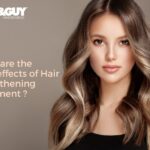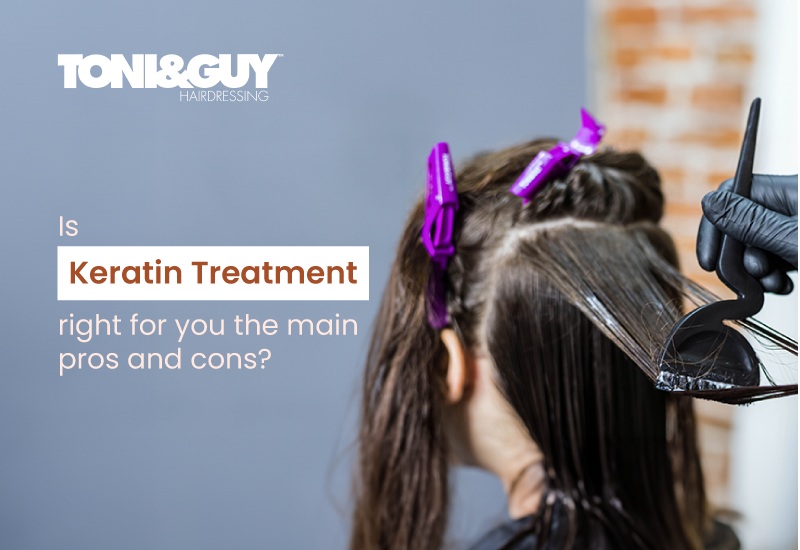
What is Keratin?
The structural foundation of many human tissues, including hair, skin, nails, and the outer layer of the epidermis, is made up of the hard, fibrous protein keratin.
It gives these constructions durability, strength, and security. Keratin, in relation to hair, is a significant constituent of the hair shaft and contributes to the preservation of the strength, pliability, and general structure of hair.
What is Keratin Treatment?
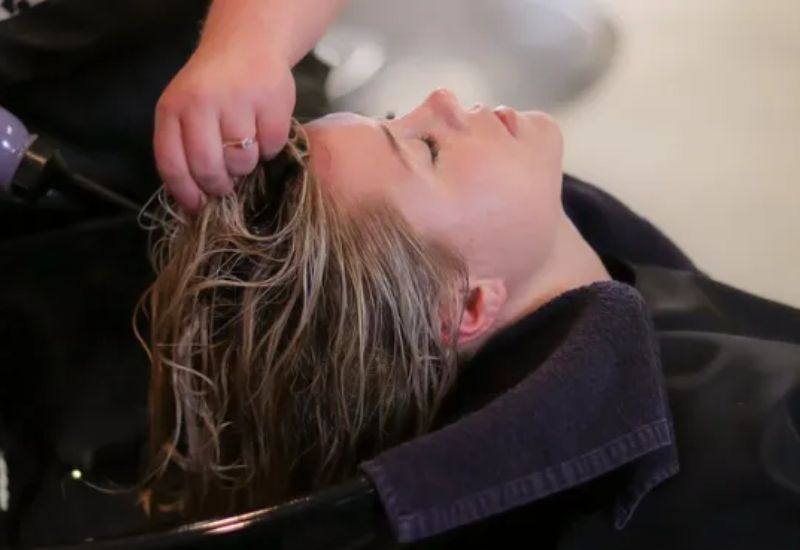
A keratin treatment, also called a “Brazilian keratin treatment,” is a process that uses a unique formula that includes liquid keratin and other chemicals to smooth and straighten hair. The goal of this treatment is to manageably minimise frizz and tame unmanageable hair.
The liquid keratin is sealed into the hair’s cuticle by applying heat after the product has been applied to the hair. The end effect is hair that is easier to style and is smoother, shinier, and more relaxed.
Smooth, straight hair can be achieved with keratin treatments, but it’s vital to remember that certain formulas include formaldehyde or other chemicals, so use them carefully and in well-ventilated settings.
Pros and cons of Keratin Treatment
| Pros of Keratin Treatment | Cons of Keratin Treatment |
| Frizz Reduction: Tames unruly hair and reduces frizz, especially in humid conditions. | Chemical Exposure: Some treatments contain potentially harmful chemicals like formaldehyde. |
| Straightening Effect: Provides temporary straightening for curly or wavy hair. | Temporary Results: Effects gradually wear off, necessitating regular touch-ups. |
| Improved Shine: Enhances hair’s shine and overall appearance, making it look healthier. | Cost: Professional treatments can be expensive, impacting your budget. |
| Easier Styling: Treated hair is more manageable, saving time and effort during styling. | Duration: The application process can be time-consuming, requiring patience. |
| Less Styling Products: Reduced need for styling products, saving time and money. | Sensitivity: Some individuals may experience scalp irritation or redness. |
| Restrictions on Hair Care: Post-treatment care guidelines may limit activities like washing, swimming, or using specific shampoos. | |
| Loss of Natural Curl: Those with curls may experience temporary loss of curl pattern. | |
| Environmental Impact: Some treatments contain chemicals harmful to the environment. | |
| Health and Safety Concerns: Long-term effects of chemical exposure are not fully understood. |
Advantages of Keratin Treatment
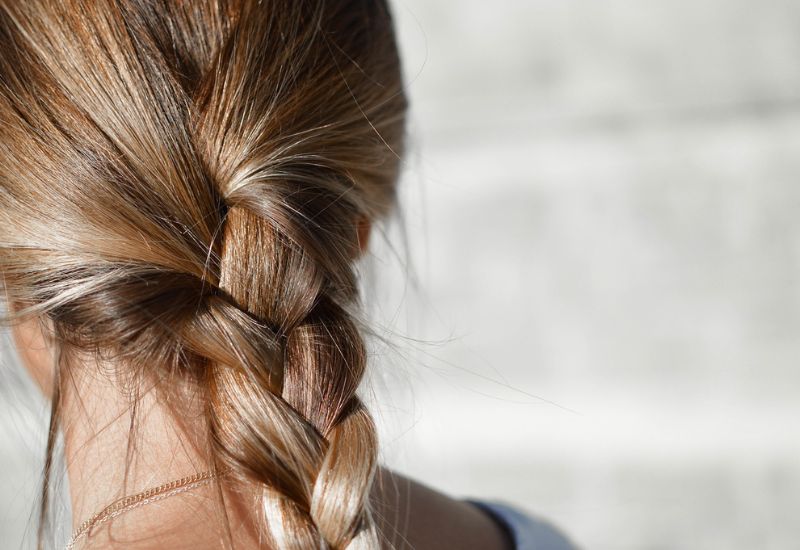
Keratin hair treatments offer several advantages that make them a popular choice for individuals seeking smoother, more manageable, and frizz-free hair:
Frizz Reduction: Keratin treatments effectively combat frizz, making hair appear sleek and polished. This is particularly beneficial in humid or damp weather conditions.
Improved Manageability: Treated hair becomes more manageable and easier to style, reducing the time and effort required for daily hair care routines.
Shine and Lustre: Keratin treatments enhance the natural shine and lustre of the hair, resulting in a healthier and more vibrant appearance.
Straightening Effect: These treatments provide temporary straightening for those with curly or wavy hair, offering a sleek and polished look without the need for daily heat styling.
Reduced Styling Products: With the frizz and unruliness under control, you’ll find that you need fewer styling products, saving time and money in the long run.
Long-Lasting Results: While not permanent, the effects of a keratin treatment can last for several weeks to months, reducing the need for frequent touch-ups.
Overall Hair Health: The smoothing and protective effects of keratin can help maintain the health and integrity of your hair, reducing breakage and split ends.
Versatility: Keratin treatments are suitable for various hair types, and they can be customised to achieve the desired level of straightness or smoothness.
Time-Saving: The convenience of smoother, more manageable hair can significantly reduce the time spent on daily styling routines.
Disadvantages of Keratin Treatment
As was previously said, keratin hair treatments have a number of benefits, but they also have a number of drawbacks.
Chemical Exposure: Many keratin treatments contain formaldehyde or other chemicals that can be harmful when inhaled or absorbed through the skin. Prolonged exposure to these chemicals can pose health risks.
Temporary Results: Keratin treatments are not permanent, and the effects gradually wear off over time, typically lasting a few months. Regular touch-ups are required to maintain the results.
Cost: Professional keratin treatments can be expensive, and the cost can add up if you need regular touch-ups, making it less budget-friendly for some.
Duration: The application process can be time-consuming, often taking several hours, which may not be convenient for everyone.
Sensitivity: Some individuals may be sensitive to the chemicals in keratin treatments, leading to scalp irritation, itching, or redness. It’s essential to perform a patch test before getting the treatment.
Restrictions on Hair Care: After a keratin treatment, you may be advised not to wash your hair for a specific period, which can be inconvenient. Additionally, you may need to use sulfate-free shampoos and avoid chlorine and saltwater to maintain the treatment’s effects.
Loss of Curl: While many people desire straighter hair, if you have naturally curly or wavy hair and wish to maintain those curls, a keratin treatment can temporarily reduce or eliminate them.
Environmental Impact: The chemicals used in some keratin treatments can be harmful to the environment, so it’s important to choose treatments that are more eco-friendly.
Health and Safety Concerns: There are ongoing debates about the safety of certain chemicals in keratin treatments, and the long-term health effects of regular exposure to these chemicals are not fully understood. It’s crucial to prioritise your health and safety.
Keratin treatments can reduce frizz and make hair easier to manage, but they also raise issues with chemical exposure, expense, and environmental effects. To determine whether a keratin treatment is best for you, it’s critical to thoroughly consider the benefits and drawbacks and speak with a qualified stylist.
Choosing If a Keratin Treatment Is the Correct Option for You
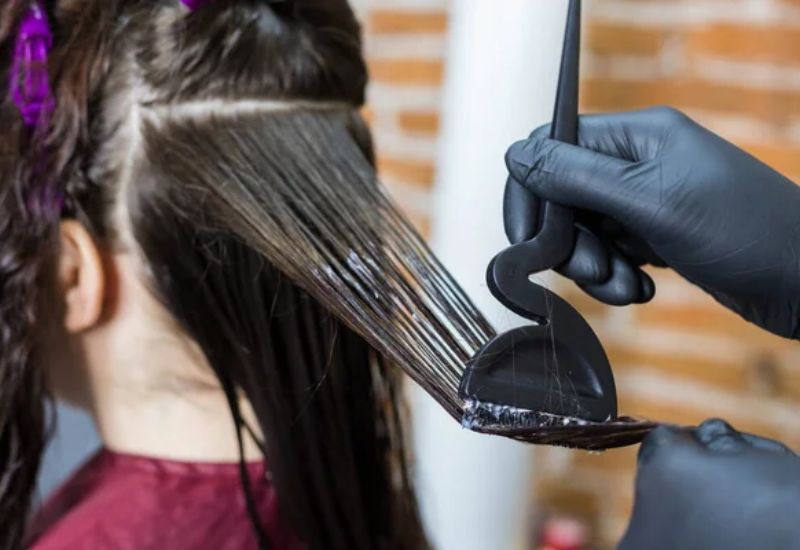
It’s important to think about your lifestyle, hair type, and personal preferences when deciding if a keratin treatment is right for you. To assist you in making an informed choice, consider the following advice and inquiries:
Hair Type: Consider your hair type. Keratin treatments work best for frizzy, unruly, or curly hair. If you have naturally straight hair, you might not benefit as much from the treatment.
Maintenance: Are you prepared for the maintenance involved? Keratin treatments require specific care routines, such as using sulfate-free shampoos and avoiding chlorine and saltwater. Will these adjustments fit your lifestyle?
Sensitivity: Do you have a sensitive scalp or allergies to certain chemicals? Ensure the treatment formula is compatible with your skin and health conditions.
Budget: Keratin treatments can be expensive. Evaluate whether the cost aligns with your budget, considering the need for occasional touch-ups.
Expectations: Understand that keratin treatments offer temporary results. If you’re looking for a permanent change, this may not be the right choice for you.
Environmental Concerns: If you’re eco-conscious, research eco-friendly treatment options that have minimal environmental impact.
Consultation: Consult with a professional stylist to assess your unique hair needs and discuss potential outcomes.
In the end, you should make a decision based on your objectives and situation, making sure that a keratin treatment suits your lifestyle, hair type, and personal tastes.
Closing thoughts
Making the choice to have a keratin treatment should be well thought out. It’s critical to comprehend the primary benefits, which include less frizz, enhanced manageability, and temporary straightening.
But it’s also important to recognise the drawbacks, like chemical exposure and maintenance requirements. Your decision should be based on your particular hair type, lifestyle, and personal preferences.
It is strongly advised that you consult with a professional stylist, as they may offer customised guidance depending on your unique requirements. Finding the balance between your intended outcomes and any potential downsides will ultimately determine whether or not a keratin treatment is good for you. Make sure your haircare decision is in line with your personal priorities.
FAQs
- Are there any disadvantages of keratin?
Indeed, keratin treatments have drawbacks. These include the possibility of scalp discomfort, the temporary loss of natural curls, exorbitant expenses, time-consuming application, exposure to chemicals (such as formaldehyde), and transient results necessitating repeated touch-ups.
Prolonged exposure to certain chemicals raises ongoing health issues, and certain therapies may also have an impact on the environment.
- What are the negatives of keratin treatment?
Exposure to potentially hazardous chemicals, transient results needing frequent touch-ups, high expense, labour-intensive application, possible sensitivity of the scalp, limitations on hair care regimens, and the transient loss of natural curls are some drawbacks of keratin treatments. Long-term health hazards and environmental concerns are also taken into account.
- Are keratin treatments good or bad for your hair?
There are advantages and disadvantages to keratin treatments for hair. They provide instant advantages, including less frizz and easier management. However, over time, they could cause damage because they need to be maintained and might contain dangerous substances. Your preferences, hair type, and health should all be taken into account when making this selection.
- Is it worth doing keratin treatment?
Your unique hair needs and preferences will determine whether or not you should get a keratin treatment. A keratin treatment can be worthwhile if you want frizz-free, manageable, and softer hair. But before making a decision, take into account the expense, upkeep, and possible effects on your health and the environment.
- Do celebrities get keratin treatment?
Yes, keratin treatments are popular among celebrities who want to have manageable, smooth hair. Due to its ability to give hair a polished, frizz-free look—a necessary quality for the demands of red-carpet events and on-screen appearances—it is a popular choice in the entertainment world.
- Does keratin stop hair fall?
Treatments with keratin don’t stop hair loss. They mostly concentrate on minimising frizz and boosting texture, while they can also make hair look better and be easier to manage. Not all hair fall is caused by keratin treatments; other factors that impact hair fall include genetics, diet, and the general condition of the hair.


